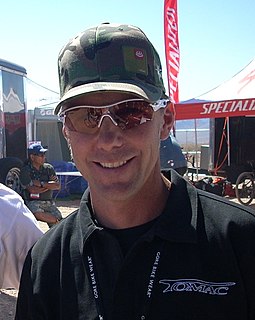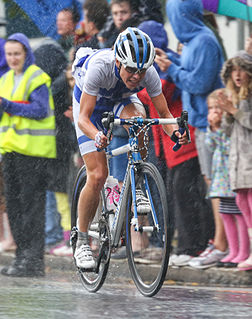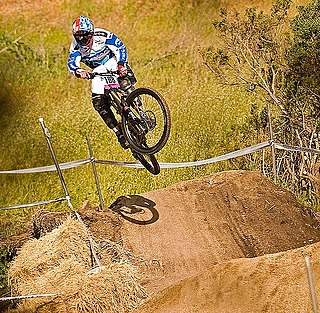



The Wisconsin Off Road Series (usually WORS) is an off-road bicycle racing series in Wisconsin, United States. The series is billed as "America's largest state mountain bike racing series." [1]




The Wisconsin Off Road Series (usually WORS) is an off-road bicycle racing series in Wisconsin, United States. The series is billed as "America's largest state mountain bike racing series." [1]
The series began in 1991 as six separate races that were connected by a points system and overall scoring. The series has evolved to a twelve-race season. The series has 17% female participation, which is far above the national average of around 9%. [1]
The series has been sanctioned by the National Off-Road Bicycle Association since 2003, when it averaged over 800 riders per event. [2]
There are five classes (listed from lowest to highest difficulty level)

BMX, an abbreviation for bicycle motocross or bike motocross, is a cycle sport performed on BMX bikes, either in competitive BMX racing or freestyle BMX, or else in general on- or off-road recreation.
The Cannondale Bicycle Corporation is an American division of Canadian conglomerate Dorel Industries that supplies bicycles. Its headquarters are in Wilton, Connecticut with engineering offices in Freiburg, Germany. Frames are manufactured in Taiwan. Bikes are assembled in Taiwan, as well as in the USA and in The Netherlands for the local markets.
Trek Bicycle Corporation is a bicycle and cycling product manufacturer and distributor under brand names Trek, Electra Bicycle Company, Bontrager, and Diamant Bikes. The company has previously manufactured bikes under the Gary Fisher, LeMond Racing Cycles, Klein, and Villiger Bikes brand names. With its headquarters in Waterloo, Wisconsin, Trek bicycles are marketed through 1,700 independently owned bicycle shops across North America, subsidiaries in Europe, Asia, South Africa, as well as distributors in 90 countries worldwide. Most Trek bicycles are manufactured outside the United States, in countries including the Netherlands, Germany, Taiwan and China.

Cyclo-cross is a form of bicycle racing. Races typically take place in the autumn and winter, and consist of many laps of a short course featuring pavement, wooded trails, grass, steep hills and obstacles requiring the rider to quickly dismount, carry the bike while navigating the obstruction and remount. Races for senior categories are generally between 40 minutes and an hour long, with the distance varying depending on the ground conditions. The sport is strongest in the traditional road cycling countries such as Belgium, France and the Netherlands.

Cycle sport is competitive physical activity using bicycles. There are several categories of bicycle racing including road bicycle racing, cyclo-cross, mountain bike racing, track cycling, BMX, and cycle speedway. Non-racing cycling sports include artistic cycling, cycle polo, freestyle BMX and mountain bike trials. The Union Cycliste Internationale (UCI) is the world governing body for cycling and international competitive cycling events. The International Human Powered Vehicle Association is the governing body for human-powered vehicles that imposes far fewer restrictions on their design than does the UCI. The UltraMarathon Cycling Association is the governing body for many ultra-distance cycling races.

The Schwinn Bicycle Company was founded by German-born mechanical engineer Ignaz Schwinn (1860–1948) in Chicago in 1895. It became the dominant manufacturer of American bicycles through most of the 20th century. After declaring bankruptcy in 1992, Schwinn has since been a sub-brand of Pacific Cycle, owned by the multi-national conglomerate, Dorel Industries.

Downhill mountain biking (DH) is a genre of mountain biking practiced on steep, rough terrain that often features jumps, drops, rock gardens and other obstacles. Jumps can be up to and including 12 meters, and drops can be greater than 3 meters.

John Tomac is an American former professional cyclist who competed from 1985 to 2005. He was a versatile rider who competed in multiple disciplines including; BMX racing, cross-country, road racing, trials riding and downhill racing. Tomac became a mountain bike racing icon in the late 1980s as the sport began to develop beyond its formative years. At the time of his retirement in 2005, he had won more mountain bike races than anyone in the sport. In 1991 he was inducted into the Mountain Bike Hall of Fame and, in 2004 he was inducted into the United States Bicycling Hall of Fame.

This is a glossary of terms and jargon used in cycling, mountain biking, and cycle sport.

Joe Breeze is an American bicycle framebuilder, designer and advocate from Marin County, California. An early participant in the sport of mountain biking, Breeze, along with other pioneers including Gary Fisher, Charlie Kelly, and Tom Ritchey, is known for his central role in developing the mountain bike. Breeze is credited with designing and building the first all-new mountain bikes, which riders colloquially called Breezers. He built the prototype, known as Breezer #1, in 1977 and completed nine more Series I Breezers by early 1978. Breezer #1 is now in the collection of the Smithsonian Institution’s National Museum of American History.

Mountain bike racing is the competitive cycle sport discipline of mountain biking held on off-road terrain. The Union Cycliste Internationale (UCI) recognised the discipline relatively late in 1990, when it sanctioned the world championships in Durango, Colorado. The first UCI Mountain Bike World Cup series took place in 1988. Its nine-race circuit covered two continents—Europe and North America—and was sponsored by Grundig. Cross-country racing was the only World Cup sport at this time. In 1993, a six-event downhill World Cup was introduced. In 1996, cross-country mountain biking events were added to the Olympic Games. In 2006, cross-country mountain biking events became part of the World Deaf Cycling Championships for the first time in San Francisco, USA.
Keith Bontrager is a motorcycle racer who became a pioneer in the development of the modern mountain bike. Between 1980 and 1995, he was president of his own Bontrager Company, which continues to develop components for Trek Bicycle Corporation after Trek bought out Bontrager.

USA Cycling or USAC, based in Colorado Springs, Colorado, is the national governing body for bicycle racing in the United States. It covers the disciplines of road, track, mountain bike, cyclo-cross, and BMX across all ages and ability levels. In 2015, USAC had a membership of 61,631 individual members.
David "Tinker" Juarez is an American former professional BMX and cross-country mountain bike racer. His prime competitive years in BMX were from 1978 to 1984 and in mountain bike racing 1986 to 2005. Since late 2005, he has competed as a Marathon mountain bike racer. In all three disciplines, he has won numerous national and international competitions. Most recently, Juarez finished third in the 2006 Race Across America Endurance bicycle race.

Eric Robert Carter, is a former American professional "Old/Mid School" Bicycle Motocross (BMX) racer whose prime competitive years were from 1983 to 1998. He had the nickname "The Golden Child," and later in his BMX career, acquired the moniker "The Earthquake." More recently, he has been known simply as "EC." Beginning in 1996, he converted fully to mountain bike racing (MTB) and has become one of the most respected racers in that discipline of bicycle racing.

Pia Ann-Katrine Sundstedt is a professional former cyclist, who competes in road bicycle racing and mountain bike racing, as well as cross-country skiing events. Sundstedt competed in the Summer Olympics for Finland. Having started in 2006, Sundstedt competes for Rocky Mountain/Business Objects mountain bike racing team.

Robert ("Bob") Charles Mionske is a two-time U.S. Olympic racing cyclist and U.S. National Champion (1990). In the 1988 Summer Olympics, held in Seoul, South Korea, he placed fourth in the Individual Road Race. He retired from professional cycling in 1993 and is now an attorney based in Portland, Oregon, with a practice in bicycle law. He wrote Legally Speaking, a national column on bicycle law, between 2002 and 2009, and has also written Bicycling & the Law: Your Rights as a Cyclist, a book on bicycle law published in August 2007. Mionske has written his Legally Speaking column on bicycle law for VeloNews and his Road Rights column on bicycle law for Bicycling Magazine. In February 2015, Mionske returned to writing his Legally Speaking column at VeloNews.

Tara Janelle Llanes is a Bicycle Motocross (BMX) racer whose prime competitive years were from 1990-1993. She became a champion Mountain Bike (MTB) racer. She later played wheelchair tennis and wheelchair basketball for Canada. Her surname is pronounced "Yaw-ness" but for obvious reasons it is often mispronounced "lanes" as in the type of division of a pathway.

Cycling in New Zealand, while relatively popular as a sport, is a very marginal commuting mode, with the share hovering around 1–3% in most major cities. This is due to a number of factors, principally safety fears.

Cycling in Canberra, the capital city of Australia, is a popular means of transportation, sporting and recreational pass time. Commuting in the city is supported by an extensive network of urban cycleways and on-street bicycle lanes. As a city established in the 20th century, Canberra's development was heavily influenced by the automobile for much of its history. The popularity of cycling in the city has increased dramatically in the 21st century with growing awareness of environmental issues, government policy supporting active transport and investment in cycling infrastructure. This has led to the development of a strong cycling culture.